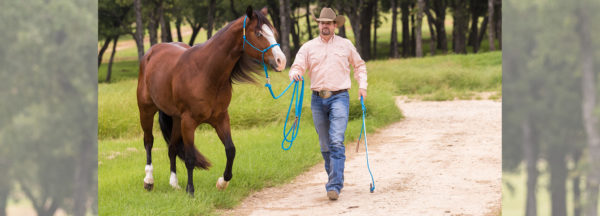Training Tip: Does Your Horse Have Bad Turnout Manners?

Almost all horses that bolt away from their handlers in the pasture are a product of a human’s negligence. Think about how you turn your horse out. Most people lead their horse out to the pasture and once they reach the gate, they immediately take the halter off and let the horse walk away from them. It doesn’t take long before the horse anticipates being turned out to eat grass and be with his buddies, so when the person starts taking the halter off, he turns his head away, eyeing up his next meal or watching his buddies. Then the next time he’s led to the pasture, he starts walking off before the person even has the halter off his head. And it just builds from there. Before you know it, the horse is dragging you to the pasture while you desperately try to hold onto the lead rope.
Horses are great at predicting our moves. They know what we’re going to do before we do it. The first time your horse turns away from you and the lead rope slips through your hand, you plant a seed in his mind. “Ah,” he says, “that’s interesting. I turned my head and she didn’t do anything about it. I wonder what would happen if I just started walking off? I bet I’d get to join my friends even sooner.” Once the seed is planted and you let him do the same thing again, a habit starts to form. The longer you let the habit go on for, the harder it is to correct.
My first suggestion to people with this problem is to start the Method from the beginning and work your way through the Fundamentals Series – not skipping a step. Your horse’s behavior is a clear sign that you have no control of his feet. Once you get control of his feet and prove to him that you’re the leader in your relationship, your problem will more than likely disappear.
